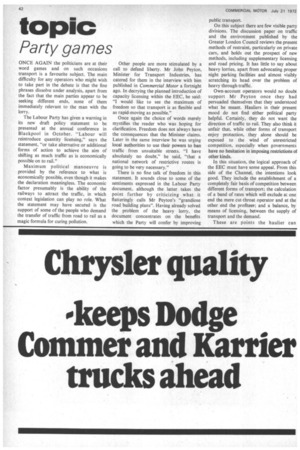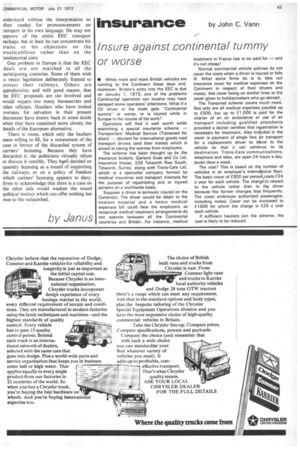topic Party games
Page 44

Page 45

If you've noticed an error in this article please click here to report it so we can fix it.
ONCE AGAIN the politicians are at their word games and on such occasions transport is a favourite subject. The main difficulty for any operators who might wish to take part in the debate is that the fine phrases dissolve under analysis, apart from the fact that the main parties appear to be seeking different ends, none of them immediately relevant to the man with the lorry.
The Labour Party has given a warning in its new draft policy statement to be presented at the annual conference in Blackpool in October. "Labour will reintroduce quantity licensing," says the statement, "or take alternative or additional forms of action to achieve the aim of shifting as much traffic as is economically possible on to rail."
Maximum political manoeuvre is provided by the reference to what is economically possible, even though it makes the declaration meaningless. The economic factor presumably is the ability of the railways to attract the traffic, in which context legislation can play no role. What the statement may have secured is the support of some of the people who demand the transfer of traffic from road to rail as a magic formula for curing pollution.
Other people are more stimulated by a call to defend liberty. Mr John Peyton, Minister for Transport Industries, has catered for them in the interview with him published in Commercial Motor a fortnight ago. In decrying the planned introduction of capacity licensing within the EEC, he said: "I would like to see the maximum of freedom so that transport is as flexible and as rapid-moving as possible."
Once again the choice of words merely mystifies the reader who was hoping for clarification. Freedom does not always have the consequences that the Minister claims. Later in the same interview he was urging local authorities to use their powers to ban traffic from unsuitable streets. "I have absolutely no doubt," he said, "that a national network of restrictive routes is going to be very necessary."
There is no fine talk of freedom in this statement. It sounds close to some of the sentiments expressed in the Labour Party document, although the latter takes the point further by criticizing what it flatteringly calls Mr Peyton's "grandiose road building plans". Having already solved the problem of the heavy lorry, the document concentrates on the benefits which the Party will confer by improving public transport.
On this subject there are few visible party divisions. The discussion paper on traffic and the environment published by the Greater London Council reviews the present methods of restraint, particularly on private cars, and holds out the prospect of new methods, including supplementary licensing and road pricing. It has little to say about heavy lorries, apart from advocating proper night parking facilities and almost visibly scratching its head over the problem of heavy through-traffic.
Own-account operators would no doubt support Mr Peyton once they had persuaded themselves that they understood what he meant. Hauliers in their present mood do not find either political party helpful. Certainly, they do not want the direction of traffic to rail. They also think it unfair that, while other forms of transport enjoy protection, they alone should be exposed to the wind of unrestricted competition, especially when governments have no hesitation in imposing restrictions of other kinds.
In this situation, the logical approach of the EEC must have some appeal. From this side of the Channel, the intentions look good. They include the establishment of a completely fair basis of competition between different forms of transport; the calculation of a band of rates which will exclude at one end the mere cut-throat operator and at the other end the profiteer; and a balance, by means of licensing, between the supply of transport and the demand.
These are points the haulier can
mderstand without the interpretation so )ften needed for pronouncements on ransport in his own language. He may not ipprove of the entire EEC transport mckage, but at least he can concentrate his )raise or his objections on the 3racticabilities rather than on the -undamental aims.
One problem in Europe is that the EEC deals are not matched in all the Darticipating countries. Some of them wish .o retain legislation deliberately framed to 3 rotect their railways. Others are ipprehensive, and with good reason, that .he EEC proposals are too involved and would require too many bureaucrats and 3ther officials. Hauliers who have looked 3verseas for salvation in their present discontent have drawn back in some doubt when they have examined more closely the details of the European alternative.
There is room, which only the hauliers seem wilting to fill, for a restatement of the case in favour of the discarded system of carriers' licensing. Because they have discarded it, the politicians virtually refuse to discuss it sensibly. They hy(e decided on quantity licensing as a means of supporting the railways, or on a policy of freedom which carriers' licensing appears to deny. Even to acknowledge that there is a case on the other side would weaken the sound political instinct which can offer nothing but woe to the vanquished.




























































































